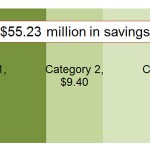Transportation Infrastructure: Making a High Priority Low
In today’s Providence Journal, Bruce Landis traces the local implications of Washington, D.C’s current partisan wrestling match over transportation funding. This paragraph is of particular relevance to Rhode Islanders (especially those who think the state needs to make some real changes to the way the state conducts itself:
Because the state does not use any of its own money to finance its highway projects, Rhode Island’s program is entirely dependent on federal money and particularly vulnerable to disruption. (The state borrows the 20-percent local share of project costs that it must contribute. That appears on the ballot every two years in the transportation bond issue.)
The obvious question is why the state would take one of its primary functions — something that only the most resolute libertarians would deny as under its purview and about which there is almost universal agreement about its importance to everything from economic development to public safety — and leave it entirely to borrowing and federal aid. The almost-as-obvious answer is that the very importance of such spending makes it an easy sell to voters when it comes time for ballot approval of more borrowing, and the federal aid keeps the dollars borrowed within tolerable bounds. (If the state left its most corrupt, unnecessary, and/or controversial spending for debt votes, much less would be approved.)
It’s difficult to think of a better word for such a practice than “mismanagement,” and such practices provide examples for anybody who wonders why so many people distrust government to the point of considering it a scheme perpetrated against the people it is ostensibly meant to represent.


